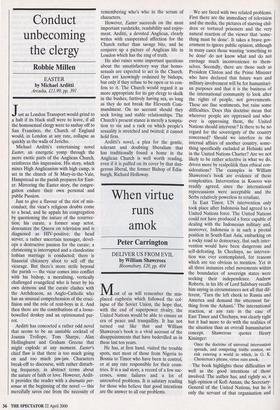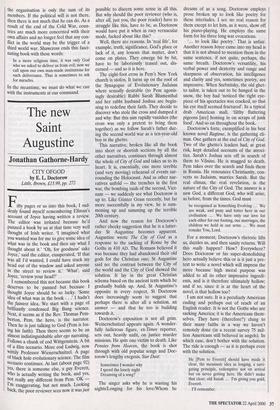When virtue runs amok
Peter Carrington
DELIVER US FROM EVIL by William Shawcross Bloomsbury, £20, pp. 404 Most of us will remember the mis- placed euphoria which followed the col- lapse of the Soviet Union, the hope that, with the end of superpower rivalry, the United Nations would be able to ensure an era of peace and tranquillity. It has not turned out like that and William Shawcross's book is a vivid account of the disappointments that have bedevilled us in these last ten years.
He has, at first hand, visited the trouble spots, met most of those from Nigeria to Bosnia to Timor who have been in control, or at any rate responsible for their coun- tries. It is a sad story, a record of a few suc- cesses, some failures and a lot of unresolved problems. It is salutary reading for those who believe that good intentions are the answer to all our problems. We are faced with two related problems. First there are the immediacy of television and the media, the pictures of starving chil- dren or tortured prisoners and the very natural reaction of the viewer that 'some- thing must be done'. It takes a brave gov- ernment to ignore public opinion, although in many cases those wanting 'something to be done' do not know what and do not envisage much inconvenience to them- selves. Secondly, there are those such as President Clinton and the Prime Minister who have declared that future wars and military involvement will be for humanitari- an purposes and that it is the business of the international community to look after the rights of people, not governments. These are fine sentiments, but raise some difficulties. Does this doctrine mean that wherever people are oppressed and who- ever is oppressing them, the United Nations should intervene? Is there to be no regard for the sovereignty of the country concerned? Should we interfere in the internal affairs of another country, some- thing specifically excluded at Helsinki and in the United Nations Charter? Are we not likely to be rather selective in what we do, driven more by realpolitik than ethical con- siderations? The examples in William Shawcross's book are evidence of these complexities. Intervention in Kosovo was readily agreed, since the international repercussions were acceptable and the Serbs relatively powerless to retaliate.
In East Timor, UN intervention only took place after Indonesia had agreed to a United Nations force. The United Nations could not have produced a force capable of dealing with the Indonesian military and, moreover, Indonesia is in such a pivotal position in South-East Asia, embarking on a rocky road to democracy, that such inter- vention would have been dangerous and self-defeating. In Chechnya, no interven- tion was ever contemplated, for reasons which are too obvious to mention. Yet in all three instances rebel movements within the boundaries of sovereign states were seeking their independence. Andrew Roberts, in his life of Lord Salisbury recalls him saying in circumstances not all that dif- ferent, 'Turn the left cheek to Russia and America and demand the uttermost far- thing from the Ashanti.' The international reaction, at any rate in the case of East Timor and Chechnya, was clearly right but it had more to do with the realities of the situation than an overall humanitarian concept. Shawcross quotes Henry Kissinger: Once the doctrine of universal intervention spreads, and competing truths contest, we risk entering a world in which, in G. K- Chesterton's phrase, virtue runs amok.
The book highlights these difficulties as well as the good intentions of those involved. The author has, and rightly so, a high opinion of Kofi Annan, the Secretary- General of the United Nations, but he is only the servant of that organisation and the organisation is only the sum of its members. If the political will is not there, then there is not much that he can do. As a result of the end of the Cold War, coun- tries are much more concerned with their own affairs and no longer feel that any con- flict in the world may be the trigger of a third world war. Shawcross ends this fasci- nating book with these words:
In a more religious time, it was only God who we asked to deliver us from evil; now we call upon our own man-made institutions for such deliverance. That is sometimes to ask for miracles.
In the meantime, we must do what we can with the instruments at our command.



























































 Previous page
Previous page